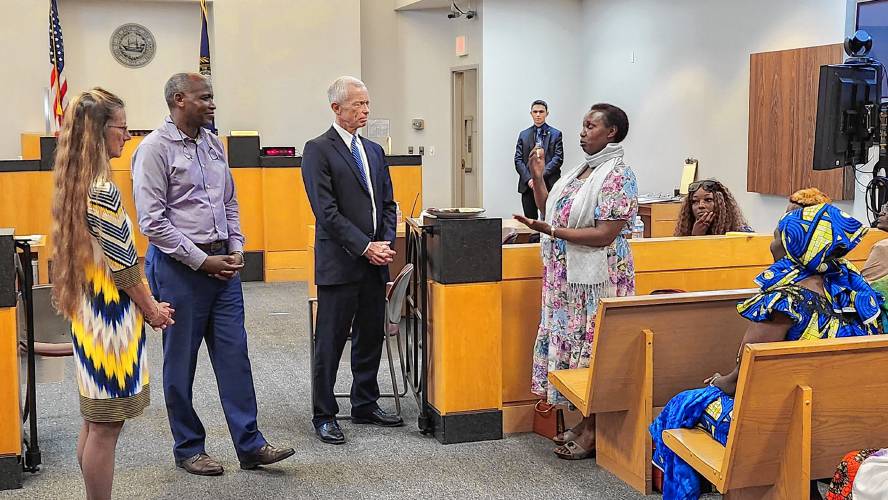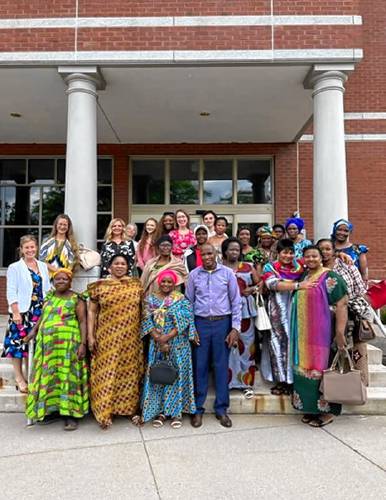As the judicial system seeks to improve equity, judges are turning to the public for feedback
| Published: 01-06-2024 11:22 AM |
When New Hampshire courts offer translation services for non-native English speakers, there’s often a mismatch between intent and execution.
Forget differing sentence structures, tenses and not to mention baseline words – when each word is directly translated – the meaning can become muted. Clarity and context, two essentials of the court process, suffer.
“There’s so much terminology and words that don’t translate to Swahili or other languages,” said Clement Kigugu, the executive director at Overcomers Refugee Services. “So we need this to explain, what did that mean?”
Leaders of New Hampshire’s judicial system know this can be a barrier and one aspect of the court system that can be improved.
Over the last year, the Steering Committee on Diversity and Inclusion has started to pick apart the court system, both internally and externally, to find gaps in access and ensure that the system is fair and unbiased, said Susan Carbon, a circuit court judge and one of the founding chairs of the committee.
It’s an effort that has taken court personnel and judges to all corners of the state for listening sessions in communities. The court system is also reviewing its hiring process and how it can better operate as an employer.
“We want to look internally at ourselves, to how do we recruit and retain. Who are we within the court system, our own demographics,” said Carbon. “And then externally, how are we working with the public? Are we serving the public the way we should? What can we do to improve how we’re serving?”
In the basement of the Nashua Public Library, several small tables and folding chairs populated the otherwise empty room.
Article continues after...
Yesterday's Most Read Articles
 Concord may finally buy long-closed rail line with hopes of creating city-spanning trail
Concord may finally buy long-closed rail line with hopes of creating city-spanning trail
 New Cheers owners honor restaurant’s original menu while building something fresh
New Cheers owners honor restaurant’s original menu while building something fresh
 A look ahead at the ‘preferred design’ for Concord’s new police headquarters
A look ahead at the ‘preferred design’ for Concord’s new police headquarters
 New Hampshire targets sexual exploitation and human trafficking inside massage parlors
New Hampshire targets sexual exploitation and human trafficking inside massage parlors
 State rules Epsom must pay open-enrollment tuition to other school districts, despite its refraining from the program
State rules Epsom must pay open-enrollment tuition to other school districts, despite its refraining from the program
No prompts were on the tables, nor was there a formal agenda for the meeting. That was all intentional. David Ruoff, a Superior Court judge in Rockingham County, wanted attendees to have an open-ended, informal conversation with court staff.
There’s a tendency in the law to silo off judges from the community for fear of partiality, he said. These meetings turn isolation into access.
“We’re trying to make the courts more accessible to people and make it more accessible in a way that is meaningful for them,” Ruoff said. “One possible way of doing that is to have these public listening sessions.”
At one table, Dianne Martin, the director of the administrative office of the courts, and Tim Gudas, the Supreme Court clerk, asked questions like:
“What support do you wish was available?” And, “What barriers have you faced?”
On yellow legal pads, the two took notes from the handful of faces around the table. One man who worked with a bail fund wished there was a stronger emphasis on mental health or drug court instead of county jail. Another participant, who worked with resettling immigrants, said the court could better recognize differing cultural norms, like whether it’s polite to maintain eye contact.
At other tables, participants talked about racial fairness within the law – arrest data shows that minority groups are arrested at higher rates compared to the demographic makeup of the state.
To change the perception of racial fairness when it comes to the justice system in the state, community engagement with law enforcement is needed, agreed a group hosted by Jennifer Haggar, the Rockingham Superior Court clerk.
One community that is often missing from these conversations is youth.
“Young people don’t have a direct contact with law enforcement and vice versa,” Haggar said. “What great impact can be had when law enforcement and people in high school connect and discuss and have table conversations very similar to this.”
For people without the financial means to hire an attorney, navigating the court system is often a complex, solo effort. For pro se litigants, multiple aspects of the court process are often misunderstood, like the need to preserve records or the process to appeal cases.
“Certainly it’s not news to us, but we need to work on that,” said Michael Mace, a circuit court judge in Franklin. “It’s a critical access to justice issue.”
Over the last year, Ruoff and the steering committee held public listening sessions in Manchester, Berlin and Nashua. They spoke with specific groups, meeting with the New Hampshire chapter of the National Alliance on Mental Illness and the NH Public Defenders office. More sessions will be held in 2024.
“The mission, the message is really to make sure that we are abiding by our constitutional mandate to treat everybody equally,” said Ruoff at the Nashua event. “It doesn’t, it shouldn’t matter what the color of your skin is, what your heritage is, what language you speak, what country you’re from, what country your ancestors were from, or how much money you make, the court system should treat everybody blindly with equality.”
Carbon knows that as a white woman with two advanced degrees, her lived experience can be vastly different from the people who walk into her courtroom.
Yet, it’s her job to make sure everyone is treated fairly and their Constitutional rights upheld.
“There’s no way we can be in their shoes, and we can try to learn and empathize with their experience. Take the lessons they teach us and make it better,” she said. “I can do my best to listen to what their challenges are and try to translate those challenges and take those barriers for them and find solutions so that the system works for them.”
In the fall of 2021, Supreme Court Chief Justice Gordon MacDonald approached Carbon and Ruoff about leading the diversity and inclusion steering committee.
Together, the two judges developed a strategic plan and mission statement that was approved by the Supreme Court in the summer of 2022.
Members of the committee are tasked with focusing on training and pipeline diversity, communications, data collection, qualitative analysis, demographics and workplace policies.
To support their work, an advisory board also brings together organizations and leaders, including James McKim at the Manchester branch of the NAACP, Bruno D’Britto of the New Hampshire Brazilian Council, and Susan Stearns, executive director of NAMI-NH.
“We wanted to make sure that we had community members who were representative of various groups,” said Carbon. “Some who would bring race and ethnicity to the table, others who would bring disabilities to the table, others who would bring mental health, different constituent groups.”
Through feedback from this advisory board, the committee was able to tailor events, like these listening sessions and their formal launch last year, to be more community-oriented. Rather than meeting in courthouses, the committee is trying to meet people in more public spaces, like libraries or community centers.
In doing so, Carbon and other leaders hope to bring these lessons back to the table when thinking about court reforms.
“I really hope that what we gain is a greater insight from people about what their experiences are,” she said. “We don’t know what we don’t know, and learning from the public and trying to be very honest and humble about gathering information from them and then taking measurable steps so we can improve their experience.”
Carbon recently stepped down as co-chair of the committee after her retirement. Now, Sawako Gardner, a circuit court judge, is leading the initiative with Ruoff.
“This is a long-term committee that starts off by identifying and understanding, as well as overcoming bias,” Gardner said at the Nashua event. “To me, it shows a level of trust with the court system and also some hope, which is important, redefining what is possible.”
At the New Hampshire Supreme Court, children in the youth group from Overcomers filed into black wooden chairs as Chief Justice Gordon MacDonald addressed the crowd.
On the walls, framed portraits of mostly white men flank the courtroom. In August, a portrait of Judge Ivorey Cobb, the state’s first Black jurist, was added to the courthouses collection. He served as a judge in the Colebrook District Court from 1964 to 1981.
Although historically those who serve the state in the judicial branch don’t look like or share backgrounds similar to the growing number of New Americans that find a home in New Hampshire, that wasn’t MacDonald’s message.
Instead, he spoke with both Overcomers’ youth group and women’s group about possible careers in the court system.
“Now it’s time to see that they can be judges. They can be lawyers, they can take any position,” said Kigugu. “It’s motivating, inspiring them to pursue their education.”
These visits also go hand in hand with the steering committee’s mission – to increase access to the judicial system and offer a better understanding of how it works.
“All the time when people go to court you get there, you sit down, you listen, but you never really have time to express your experience and the need, especially in the community,” said Kigugu.
Beyond these personal visits, he wonders if a direct liaison for New Americans could help bridge the gap in the judicial system. In school districts across the state, coordinators for English language learner programs provide a direct contact and support for recently resettled families.
“Our goal is to educate and empower our group and be a part of this community,” he said. “They need to learn how the system works.”









 ‘A little piece of everything I like’: New Pittsfield barbershop brings more than a haircut to downtown
‘A little piece of everything I like’: New Pittsfield barbershop brings more than a haircut to downtown NH judge decides to pause Trump’s birthright citizenship order
NH judge decides to pause Trump’s birthright citizenship order Canterbury honors ‘real heroes’ with updated Military Veterans’ Project
Canterbury honors ‘real heroes’ with updated Military Veterans’ Project Look, up in the sky! It’s… an Airstream trailer?
Look, up in the sky! It’s… an Airstream trailer?
